How To Kill a Country
Highlights from Samantha Power's 2003 article about Robert Mugabe's "decolonization" of Zimbabwe
Comrades: Like Yuri Bezmenov 40 years ago, Samantha Power and The Atlantic warned us 20 years ago.
Yes, you read that right. Two icons of demoralization practiced real journalism in December 2003 by publishing “How To Kill a Country: Turning a breadbasket into a basket case in ten easy steps—the Robert Mugabe way.” They would never write anything like it today due to narrative control. Today, I will highlight the lessons from this “How To” piece and draw parallels between the decolonization found in 2023 America relative to 2003 Zimbabwe.
In 1980, after a civil war that cost 30,000 lives, the black majority took charge of Rhodesia, which was renamed Zimbabwe. Robert Mugabe—the nationalist leader whom [former Primer Minister Ian] Smith had branded a "Marxist terrorist" and jailed for more than a decade; a man who had once urged his followers to stop wearing shoes and socks to show they were willing to reject the trappings of European civilization—became President.
Zimbabwe, one of southern Africa's most prosperous countries, held great promise. Its Victoria Falls was one of the seven natural wonders of the world. Its gushing Zambezi River boasted wildlife and pulsing rapids. Its lush soil was the envy of a continent. And, though landlocked, the country had modernized sensibly: it had a network of paved roads, four airports, and, thanks to Mugabe's leadership, a rigorous and inclusive education system. Mugabe knew that whites drove the economy, and he was pragmatic. "Good old Bob," as white farmers quickly came to call him, kept his shoes and socks on, and urged reconciliation: "An evil remains an evil whether practiced by white against black or black against white," he said on the eve of independence. In a cordial meeting with Smith, Mugabe acknowledged that he had inherited the "jewel of Africa," and he vowed to keep it that way…
[From 2000-2003], with Zimbabwe imploding politically and economically, Mugabe has been inciting violence against whites. Yet Smith's spacious home, next door to the Cuban embassy in the capital, Harare, is shielded by neither a guard post nor a guard dog—only by purple jacaranda trees… Smith insists that when Mugabe banned him from politics, in 1987, he was glad for the opportunity to return to full-time farming. But in Zimbabwe, where whites owned the finest farmland and most blacks remained dispossessed two decades after independence, politics and land became inseparable. A few days before my visit Smith was reading the morning newspaper when he came across a government notice listing the latest batch of farms designated for seizure by the state. His farm was among them.
Although Zimbabwe is as broken as any country on the planet, it offers a testament not to some inherent African inability to govern but to a minority rule as oppressive and inconsiderate of the welfare of citizens as its ignominious white predecessor. The country's economy in 1997 was the fastest growing in all of Africa; now it is the fastest shrinking. A onetime net exporter of maize, cotton, beef, tobacco, roses, and sugarcane now exports only its educated professionals, who are fleeing by the tens of thousands. Although Zimbabwe has some of the richest farmland in Africa, children with distended bellies have begun arriving at school looking like miniature pregnant women.
How could the breadbasket of Africa have deteriorated so quickly into the continent's basket case? The answer is Robert Mugabe, now 79, who by his actions has compiled something of a "how-to" manual for national destruction. Although many of his methods have been applied elsewhere, taken as a whole his ten-step approach is more radical and more comprehensive than that of other despots. The Zimbabwe case offers some important insights. It illustrates the prime importance of accountability as an antidote to idiocy and excess. It highlights the lasting effects of decolonization—limited Western influence on the continent and a reluctance by African leaders to criticize their own. And it offers a warning about how much damage one man can do, very quickly.
1. Destroy the engine of productivity
In 2000, about 4,000 large-scale commercial farmers owned some 70% of Zimbabwe's arable land. Nearly two-thirds of these farmers had bought their farms after independence, and thus held titles issued not by Ian Smith or the British colonial regime but by the Mugabe government. Mugabe had long pledged land reform as a way of redistributing farmland to black peasants and dismantling what many saw as the country's "mini-Rhodesias." But he had delayed action for two decades, generally taking farms only on a "willing seller, willing buyer" basis. Mugabe decided on what he called "fast-track land reform" only in February of 2000, after he got shocking results in a constitutional referendum: though he controlled the media, the schools, the police, and the army, voters rejected a constitution he put forth to increase his power even further.
So he played the race card and the land card. "If white settlers just took the land from us without paying for it," the President declared, "we can, in a similar way, just take it from them without paying for it."… Initially, the farmers held their ground, but it became clear after several white farmers were murdered that they were too few and Mugabe's regime was too determined. Of the 4,000 large-scale commercial farmers in business three years ago, all but 500 have been forced off their land. Most Zimbabweans (including white farmers) say that land reform was both necessary and inevitable. The tragedy of Mugabe's approach is that it has harmed those whom a well-ordered, selective redistribution program could and should have helped. Generally the farms have not been given to black farm managers or farm workers. Indeed, because of their association with the opposition, more than a million farm workers and their dependents have been displaced, and they are now at grave risk of starvation.
In fact, the beneficiaries of the land seizures are, with few exceptions, ruling-party officials and friends of the President's. Although Mugabe's people seem to view the possession of farms as a sign of status (the Minister of Home Affairs has five; the Minister of Information has three; Mugabe's wife, Grace, and scores of influential party members and their relatives have two each), these elites don't have the experience, the equipment, or, apparently, the desire to run them. About 130,000 formerly landless peasants helped the ruling elites to take over the farms, but now that the dirty work is done, many of them are themselves being expelled. The drop-off in agricultural production is staggering. Maize farming, which yielded more than 1.5 million tons annually before 2000, is this year expected to generate just 500,000 tons. Wheat production, which stood at 309,000 tons in 2000, will hover at 27,000 tons this year. Tobacco production, too, which at 265,000 tons accounted for nearly a third of the total foreign-currency earnings in 2000, has tumbled, to about 66,000 tons in 2003.
Mugabe's belief that he can strengthen his flagging popularity by destroying a resented but economically vital minority group is one that dictators elsewhere have shared. Paranoid about their diminishing support, Stalin wiped out the wealthy kulak farming class, Idi Amin purged Uganda's Indian commercial class, and, of course, Hitler went after Jewish businesses even though Germany was already reeling from the Depression. Whatever spikes in popularity these moves generated, the economic damage was profound, and the dictators had to exert great effort to mask it.
How To Repeat History (Part 2)
Comrades: Know your history, or be doomed to repeat it. The Great Leap Forward was the largest non wartime mass killing in history, claiming 50 million lives. I am the descendent of those who suffered and died. 60 years after Great Leap Forward ended, The Great Reset is underway with eerie similarities. All you need to do is substitute a few words in the…
2. Bury the truth
Zimbabweans get their news from state television, "the first and permanent media choice for every Zimbabwean." The station is required to play at least once every hour a social-realist commercial accompanied by the jingle "Rambai Makashinga," or "Persevere." The ad shows youthful, chiseled Zimbabweans, dressed in designer jeans, dancing in maize and wheat fields as they cheerily harvest the season's crops. Many are wearing yellow and green, the colors of the ruling party. One is wearing a T-shirt bearing the number 23, signifying Mugabe's years in power. The maize is shucked to the beat, and the hoes land rhythmically in the rich red soil. The commercial reminds starving Zimbabweans what they got from their liberation from white rule: Nike sneakers and crops aplenty.
More representative of the country's actual situation is the state of the fertile crescent north of the capital. If Zimbabwe is Africa's breadbasket, the Mazowe Valley is the breadbasket of the breadbasket. Yet driving through it today is like visiting a refugee camp that has been hit by a hurricane… Government food warehouses used to contain sacks of wheat and maize piled to the sky, but the warehouses, on which the vast majority of the population depends, now stand empty. Mugabe designated the state-run Grain Marketing Board as the sole buyer and distributor of maize and wheat in the country, and he fixed prices at a fraction of market value. In a country with moderate inflation this might have kept staples at affordable prices. But given that the prices of everything else in the country, including seed and fertilizer, are doubling each month, farmers can grow these vital crops only at a severe loss. As a result both commercial and small farmers have gotten out of the maize and wheat business, shifting to crops that are not price-controlled.
Mugabe handles the unprecedented food shortages the totalitarian way: he hides them, guarding the size of GMB stocks as carefully as he would military secrets. Longtime foreign correspondents have been expelled from the country, and local journalists dare not approach the GMB, for fear of arrest… Zimbabweans are severely malnourished, and deaths from starvation occur even in the cities. The country has not yet suffered nationwide famine only because international donors have stepped in…. Western governments have given the organization $300 million to feed some 5.5 million Zimbabweans, nearly 50% of the country's population. (At the height of the Ethiopian famine, international donors fed just 20% of Ethiopia's citizens.)… Everyone and everything was responsible for food shortages except the real culprit, Mugabe himself.
How To Predict the Future (Part 4) - The Truman Show
Comrades: In case I don’t see ya - good afternoon, good evening, and good night. We are all living in The Truman Show. 25 years after its release, the movie has taken a new meaning in our astroturfed, manufactured, dystopian surveillance state. What will it take for more people to wake up like Truman did?
3. Crush dissent
Zimbabweans are remarkably unshy about criticizing Robert Mugabe's rule… Several months after rejecting Mugabe's proposed constitution, voters in the major cities swept the ruling party out of office, giving the MDC 57 of the 120 contestable parliamentary seats. In March of last year, although the ruling party beat and tortured opponents, controlled media coverage of the campaign, and posted its armed watchdogs at election booths, the voters turned up—and by all unofficial accounts elected Morgan Tsvangirai, the head of the Movement for Democratic Change, to replace Mugabe as President. Mugabe rigged the results, but Tsvangirai's supporters still call the opposition leader "Mr. President." Tsvangirai is a large man, a labor organizer who gives a rumpled impression despite his recent turn toward designer suits. "Mugabe underestimated the people and overestimated his invincibility," he told me when I met with him in August. Time will tell. For now, instead of leading protests at home, or mobilizing pressure abroad, Tsvangirai spends his days in court—fending off charges of treason, which carry the death penalty.
The MDC's message has been circulated by the Daily News, the country's only independent daily newspaper, which was launched in 1999 and quietly captured the highest newspaper readership in the country: it was so popular that it sold out by lunchtime. In January of 2001 Mugabe's Information Minister, Jonathan Moyo, described the paper as "a threat to national security which has to be silenced." Hours later the Daily News printing presses were destroyed by a bomb. This past September the government denied the irreverent paper a license, and the police shut it down.
Tsvangirai's international standing has thus far helped to keep him alive (although he was once beaten unconscious), but some of his followers have not been so lucky. About 250 Zimbabweans have died in political killings since the competition for power heated up, in 2000. According to Amnesty International, 70,000 incidents of torture and abuse took place in Zimbabwe last year alone. The government's most pervasive form of intimidation is also its most effective: the denial of food… In order to get food they are often forced to produce a ruling-party membership card or to chant such slogans as "Long live Robert Mugabe!," "Down with whites!," and "Down with Morgan Tsvangirai!" The Nobel Prize-winning economist Amartya Sen has famously argued that no functioning democracy has ever suffered a famine, because democratic governments "have to win elections and face public criticism, and have strong incentive to undertake measures to avert famines and other catastrophes." Like Pol Pot's Cambodia and Mao's China, Mugabe's Zimbabwe shows what can happen when political elites operate with no fear of being taken to task.
How To Write a Poem - "First They Came..."
Comrades: Let us pray for all who are being persecuted by tyrannical governments and for everyone else to wake up before it’s too late.
4. Legislate the impossible
For all the lawlessness in Zimbabwe, the country in fact suffers from an overabundance of laws. Indeed, Mugabe has introduced so many economic edicts in the past year that most citizens have found it impossible to keep track. He fixed the price of a loaf of bread at half the bakers' break-even price, and levied astronomical fines on any baker who charged more. Bakers stopped making bread until somebody noticed that sesame bread, a "luxury item," wasn't price-controlled; by sprinkling a few sesame seeds on their standard loaves, bakers were able to get back in business.
"Mugonomics," as Mugabe's brand of economic policy is known in Zimbabwe, addresses the symptoms of economic collapse, such as food and fuel shortages, but ignores the underlying causes. Inflation in Zimbabwe is expected to surpass 800% by year's end. Unemployment is at 70%. Zimbabwe has its own dollar, but the highest (and rarest) currency denomination, a $Z 1,000 note, cannot buy even a loaf of bread. Most transactions require hundreds of $Z 50 and $Z 100 bills….
Because the rate of inflation is astronomical in comparison with the interest rates offered by banks, Zimbabweans are desperate to withdraw their savings in order to spend the money while it still has value… The economic dynamic in Zimbabwe is perversely robust: while ordinary people suffer, black-market dealers and people with foreign bank accounts prosper, making them powerful stakeholders in the perpetuation of devastating economic policies.
How To Build Back Better
Comrades: Yuri Bezmenov outlined 4 steps to subvert a society - Demoralization, Destabilization, Crisis, Normalization. We are now one year away from the 2024 Presidential Election. Today, I will analyze the 10 steps that the Brandon regime has taken to Normalize the destruction of America. If Orange Man was responsible for any of the issues below, he w…
5. Teach hate
When Mugabe took over as President, fewer than half of Zimbabweans could read and write. He transformed the country—producing a literacy rate higher than 85%. Yet he may be remembered less for his education drive than for creating the "Green Bombers," the youth militia that emerged from the National Youth Service Training Program, introduced after the ruling party's dismal showing in the 2000 parliamentary elections.
Some 50,000 Zimbabweans aged 10 to 30 have passed through the training program since it started. The youth academies initially advertised themselves as offering training in agriculture, construction, and other occupations, but they have morphed into a paramilitary and indoctrination enterprise. When dictators feel their support slipping among adults, it is not unusual for them to alter school textbooks in the hope of enlisting impressionable youths in their cause. And because tyrants never stop worrying about the loyalty of their militaries, they often establish ruling-party militias to act as personal guarantors of their safety in the event of assassination or coup attempts. In the service of the third chimurenga in Zimbabwe, students are taught how to make gasoline bombs and set up roadblocks.
Elliot Manyika, a hard-line ruling-party official who now runs the program, says the training will teach youths to "change their mind-set ... and not aspire to be a servant of the white man," especially now that "whites are going where they came from." Many enroll reluctantly, because they know they have no chance of finding work otherwise: slots at university, at teacher and nurse training schools, and in the civil service are reserved for those who can produce certificates showing that they have graduated from a youth academy. Clad in green fatigues and red-and-green berets, those graduates who become Green Bombers vandalize MDC offices, harass Zimbabweans waiting for food, seize whites' farms, confiscate newspapers, and intimidate voters and candidates.
How To Repeat History (Part 5) - The Sunrise Movement
Comrades: Just as The Great Reset is the new Great Leap Forward and TikTok/Fentanyl are revenge for the Opium Wars, Greta Green Guards are the new Mao Red Guards. You may have seen deranged children marching around under the banner of the Sunrise Movement. As I did with The Great Leap Forward and Great Reset, I have updated the Wikipedia entry of the Re…
6. Scare off foreigners
The murder of white farmers, the attacks on the opposition, and the theft of an election have obviously done nothing to help tourism. Nor has the disappearance of two indispensable travel items: cash and fuel. One Air Zimbabwe flight attendant recently explained a two-hour delay by telling passengers that the plane was waiting for a flight arriving from London "so we can siphon from its tank." One of the reasons tourists used to visit Zimbabwe was its game parks. But many of the fences around the parks have been destroyed by squatters, and amid starvation, poachers have begun hunting even rare wildlife. Farm invaders running out of white commercial farms to seize have begun taking over wildlife preserves, creating safari parks for their personal viewing. Foreign capital is disappearing faster than the wildlife. When Mugabe called for the "indigenization of the economy," he asserted pointedly that some Zimbabweans were "more indigenous than others."
7. Invade a neighbor
As even a democracy like the United States has shown, waging war can benefit a leader in several ways: it can rally citizens around the flag, it can distract them from bleak economic times, and it can enrich a country's elites. In August of 1998 Robert Mugabe sent 11,000 soldiers—a third of his army—into the most menacing country in Africa: the Congo. He justified the invasion on the grounds that he was defending the sovereignty of an African country being invaded by Rwandan, Ugandan, and Burundian forces, which were backing a rebellion against the Congo's President, Laurent Kabila. In reality, just as Saddam Hussein went after the oil in Kuwait, Mugabe had his eye on the Congo's riches.
"There are fortunes to be made in the Congo," Tshinga Dube, one of Mugabe's colonels, told a television interviewer, "so why rush to conquer the rebels?" Mugabe's cronies did in fact get rich off diamonds, cobalt, and timber. But the war was extremely unpopular at home. As casualties mounted, some army officers grew restless and began plotting a coup, which was foiled in its planning stages. Mugabe dismissed his critics as "black white men wearing the master's cap." But it was harder for him to ignore the outrage of one of his key constituencies: the veterans of the 1970s liberation war, who saw fortunes being made in the Congo and began clamoring for the compensation Mugabe had promised them for their sacrifices. Mugabe thought he might placate the war veterans by offering up the white farms, but in the end, although the vets were the ones who expelled the white farmers, it is the country's elites who got the farms.
How To Execute a Color Revolution and Implement Regime Change
Comrades: The Swamp is simultaneously pushing a domestic cultural revolution and color revolutions abroad with our tax dollars. GAE CIA operatives have been interfering in foreign countries for decades on the Devil’s Chessboard, leading to endless wars
8. Ignore a deadly enemy
Zimbabwe's only real surplus is HIV, which has infected a third of the population, causing life expectancy to drop from 56 years in the early seventies to a deeply distressing 35 years today. In 1999 Mugabe's government actually did something that no other African government had tried: it introduced an "AIDS levy"—a 3% tax on every Zimbabwean's salary, which was to be used to fund AIDS prevention and treatment. Predictably, most of the money disappeared.
AIDS and food shortages have combined to generate what is called a "new variant famine," in which hunger weakens the immune system, speeding HIV's progression to full-blown AIDS. AIDS illnesses and deaths, in turn, further wreck the economy, reducing the number of communal farmers who can produce in the countryside, and forcing factories and mines to hire almost twice as many workers to secure the same amount of labor. Zimbabwe's neighbors have begun to treat patients with anti-retrovirals, but Mugabe can't afford the drugs… Some 3,800 deaths from AIDS occur in Zimbabwe each week. Ignorance and misinformation persist. When an AIDS death occurs in a rural area, it is still common to hear the deceased described as having been "bewitched." A recent poll revealed that condoms were thought to harbor HIV.
How To Repeat History (Part 4) - The Opium Wars
Comrades: Know your history. In Part 2 of How To Repeat History, I made minor edits in Wikipedia to show how the Green New Deal and Great Reset are modern echoes of the disastrous Great Leap Forward. Part 1 surveyed the similarities between 2022 and 1936
9. Commit genocide
Gukurahundi refers to the seasonal Zimbabwean rains that wipe out the debris of the previous year's crop. It signifies a purging of the old, a purification. In January of 1983 Robert Mugabe, a member of the ethnic Shona majority, ordered his North Korea-trained Fifth Brigade to carry out what he called a gukurahundi against the Ndebele people. The Ndebele account for about a fourth of the country's population, and Mugabe felt that they threatened him because his chief political rival at the time, Joshua Nkomo, was a Ndebele. The Nazis gave us the Final Solution; the Serbs gave us "ethnic cleansing"; the Zimbabweans have given us "wiping away."
Public discussion of the gukurahundi is forbidden in Zimbabwe. But George Mkwananzi is the self-anointed keeper of Ndebele memory. Wearing thick spectacles that keep sliding down his nose, he doesn't fit the image of a would-be rebel leader. But that is what he says he and others will become if Mugabe is not punished for the murder of the Ndebele. "In the whole history of this country nobody ever caused such a loss of life, not even Cecil John Rhodes," Mkwananzi says. Rhodes's conquest left some 5,000 Ndebele dead. Mugabe's forces are thought to have killed 25,000. "When liberation was achieved, we never experienced it as a region," Mkwananzi says. "We were merely transferred from British colonialism to Shona colonialism. If Mugabe and his henchmen are not prosecuted, we will break away and create our own country, and we will find a way to make revenge against Mugabe…”
How To Commit Genocide in Plain Sight (Part 2) - Pray for Artsakh
Comrades: Pray for the Armenians of Artsakh. They are under siege again. After living in Artsakh for several millennia, Christian Armenians are being ethnically cleansed by Azerbaijan's dictator Ilham Aliyev and the complicit "free democracies" of the West.
10. Blame the imperialists
Following the lead of British Prime Minister Tony Blair, the United States and Europe have imposed sanctions against Mugabe and 74 members of his inner circle, freezing their assets, imposing a travel ban, and forbidding arms sales. But other nations, including Malaysia, Libya, and Venezuela, have been openly supportive of the Mugabe regime. Mugabe swats away American and European criticism by citing imperial sins. "How can these countries who have stolen land from the Red Indians, the Aborigines, and the Eskimos dare to tell us what to do with our land?" he has asked. Like Castro in Cuba, Mugabe is admired in the developing world for flouting the Western powers.
The foreigner who could wield the most influence in Zimbabwe is South African President Thabo Mbeki. But Mbeki, who has insisted on a "softly, softly" approach, often seems simply to be stalling in Mugabe's behalf. In September, with Zimbabwe in its worst condition since Mugabe came to power, Mbeki said that things had normalized. Although his African National Congress once benefited from sanctions in the fight against apartheid, he has called for the termination of those against Zimbabwe. When, in 2002, Tony Blair persuaded the Commonwealth of Nations to suspend Zimbabwe, Mbeki urged that Britain be the one to exit. "Those inspired by notions of white supremacy are free to depart if they feel that membership of the association reduces them to a repugnant position imposed by inferior blacks," he said.
President Mbeki and other African heads of state are torn. On the one hand, they know that an "African renaissance" can't come about while Mugabe and people like him continue to wield power. On the other, they are power-hungry themselves, and they are terrified that their own liberation-era organizations will be left behind in such a renaissance. So they close ranks on racial and anti-imperial grounds… So many Zimbabwean refugees now flood South Africa that Mbeki grants entry only to those who can produce a bank statement proving financial solvency or a deposit of $Z 300,000. His government also deports several thousand illegal Zimbabwean immigrants each week. Botswana has found itself so overrun by desperate Zimbabweans that it is erecting an electric fence 300 miles long…
If [Mugabe] hangs on, and if other African leaders don't force him out, Zimbabwe may go in one of two directions. Its destitute citizens might be so preoccupied with finding food and staying alive that they will increasingly tune politics out. Over time their memory of—and sense of entitlement to—a better life will give way, and they will docilely submit to authorities whose power will only increase as the crisis deepens. Or the country's appalling conditions might stir a domestic revolution, a fourth chimurenga, which will bring down Mugabe and his ruling party.
The stakes are not small. Mugabe is one of the last surviving members of a club of African big men—a club that included the likes of Mobutu Sese Seko, of Zaire, and Daniel Arap Moi, of Kenya. These men led necessary and bold opposition to colonial rule, but then grew addicted to power and its opulent trappings. They began to see themselves less as rulers of their lands than as owners. As their support waned, the big men acted in ways that big men so often do, following a manual very much like Mugabe's—profiteering, stealing elections, torturing opponents, alienating professionals and foreigners, and ignoring the needs of their impoverished citizens.
Lessons Learned
Because Zimbabwe had so much going for it, and because the country has come apart at such a frighteningly brisk pace, one can see the continent's worst tendencies in microcosm. The lessons are clear. First, the contemporary skeptics of democracy—who argue that it enables tyrannies of the majority and that it ranks lower in priority than economic development—miss the central insight of the Zimbabwe experience: When a ruler operates without constraint, he can institute a tyranny of the minority, and he can plunder his country's economy and starve his people without any potential corrective. Democratic accountability is the bedrock concept that no developed or developing state can live without. An outspoken press, a healthy opposition, periodic elections, and an independent judiciary are rightly valued for themselves, but their greatest virtue is practical: they deter and thwart top-down demolition.
Second, however distant the days of imperial rule or Cold War interventions in Africa, the residual resentments are a huge psychological impediment to sensible action by African leaders. In many instances these leaders are simply deflecting attention from their own failings. But anti-colonial rants get a receptive hearing among ordinary citizens, because Western leaders have rarely acknowledged their past sins and still refuse to face up to the way the West's farm subsidies are ravaging African agriculture. Thus when things go wrong, it remains expedient—and easy—to blame the white man.
Third, regardless of the measure of Western responsibility for Africa's mess, it is clear that the future of Africa lies in the hands of African leaders. Thus far, individually and collectively, they have been more prone to hide behind the past than to take responsibility for the present. If Zimbabwe is a test of South Africa's capacity to lead an African renaissance, then South Africa has flunked that test.
Finally, Zimbabwe shows just how hard it is to destroy a place completely. Mugabe has done virtually everything conceivable to ruin his country, but one finds signs of a redoubtable spirit everywhere. Graffiti has sprung up at city bus stops, reading, "Zvakwana!," or "It's enough!" Despite arrest and torture, opposition activists remain brazen in their dissent. Displaced farm workers now survive by growing vegetables in grass patches beside bus stops. The destitute wait patiently in line to cast ballots in elections they know will be stolen. White farmers spend what's left of their savings suing for the return of their land in courts presided over by a government whose officials occupy their farmhouses. All say the same thing: Yes, Zimbabwe has been the continent's latest example of how not to govern. But the mounting severity of Mugabe's crackdown is a testament to his frustration with the resilience of civil society, which simply refuses to go away. If Mugabe were to give up power, Zimbabweans insist, the country would quickly show how liberated citizens can mend a shattered land. The effect, they say, could be contagious.
For all their differences, Mugabe and Ian Smith share a basic misconception about power: they both fail to realize that a government cannot survive indefinitely when it advances the political and economic desires of the few at the expense of the many. When I asked Smith whether he would stop leaving his front door open now that starving Zimbabweans are prowling the city, he replied, "I'm not going to change now." The same, alas, is most likely true of Robert Mugabe.
How To Harness the Power of the Powerless
Comrades: Vaclav Havel tried to warn us about Communism through his samizdat in 1978. He joins a line of legends including Solzhenitsyn’s “Live Not By Lies” in 1974, Bezmenov’s Subversion and Demoralization lecture in 1984, and Eisenhower’s farewell address in 1961






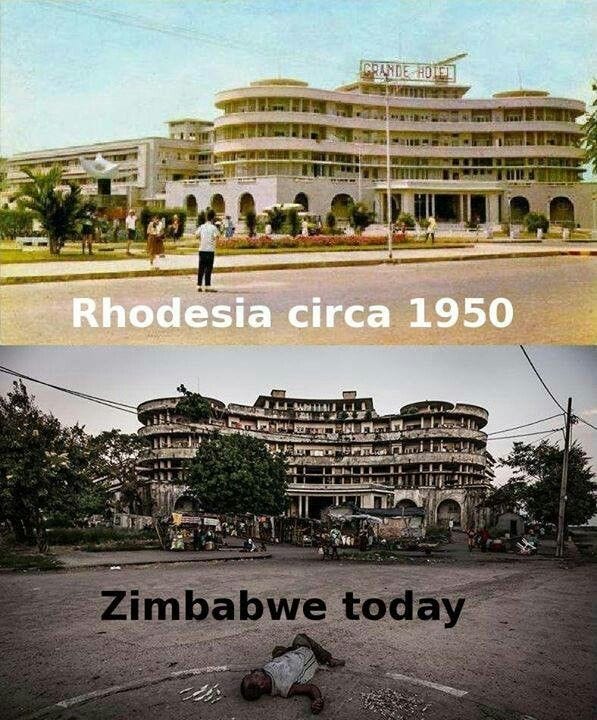


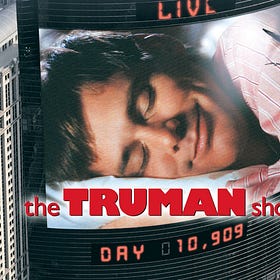
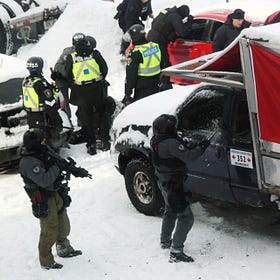


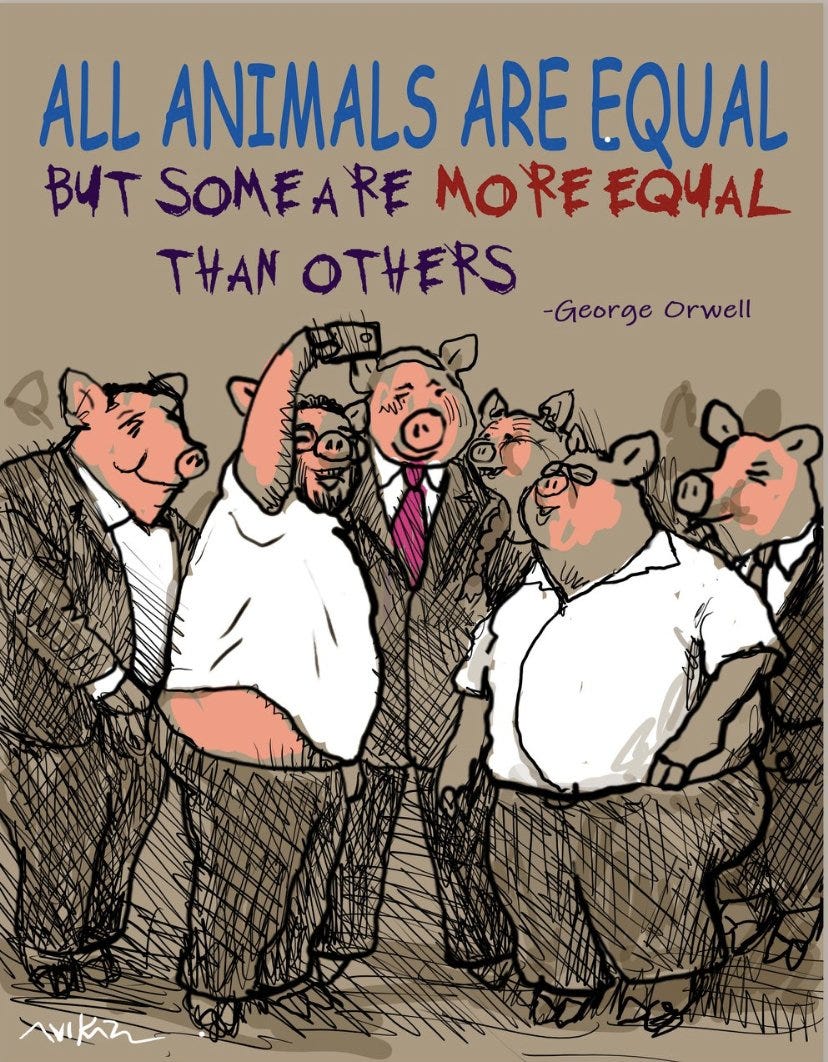
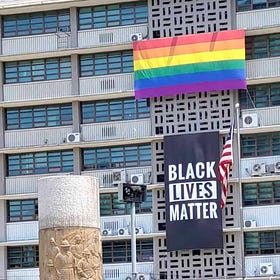


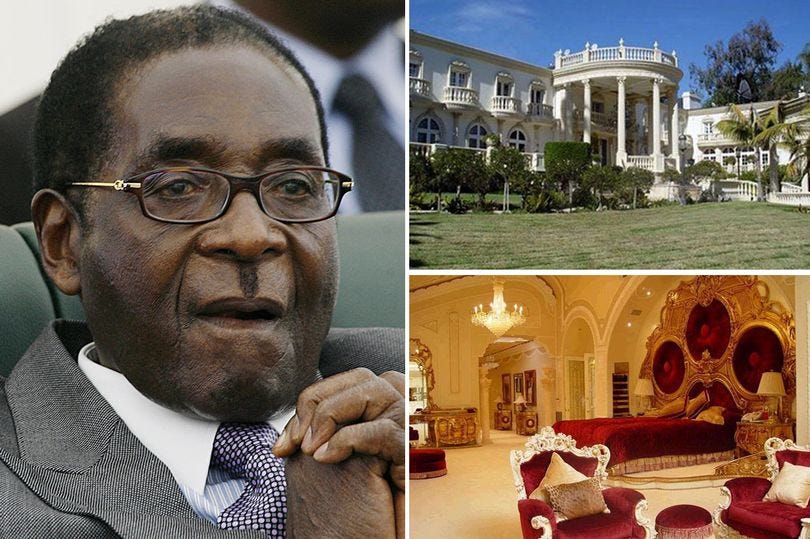

Meanwhile in the USA:
JoeBama following the Zimbabwe playbook.
Yes it pains me to agree with what you are saying. I grew up in South Africa and visited Zimbabwe a few times and contemplated emigrating to Zimbabwe as it was such a stunningly beautiful country. SA ironically is now very close to being the disaster that Zimbabwe has become. My family have lived in Canada and the US since 2005 and I personally recognized the social malaise hitting the US and Canada long before most of the locals did. I have spent many years thinking about SA and Africa vs Canada and the US how and why societies succeed or fail. Although I do not claim to have the solution the answers I have come up with are not comfortable and do not fit the popular Western liberal narrative.